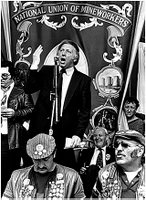(The Unite and Supersize-My-Pay campaigns conducted by McCarten and Harre continue the ‘struggle’ – the aim not so much to achieve an increase in the ‘minimum wage’ or the ‘youth rate’ as to gain a new powerbase for themselves, and the radicalisation of the youth with whom they’re working.)
 While voluntary unionism is a simple reflection of people’s right to choose whom they associate with, compulsory unionism is an imposition on that right. It is both morally and economically destructive. Compulsory unionism in New Zealand imposed artificially high wages on the economy and excluded potential non-union labour from the workforce, people who could have been employed at true market rates but who were instead left in unemployment. This acted to the detriment of productivity, and ultimately to the detriment of all workers.
While voluntary unionism is a simple reflection of people’s right to choose whom they associate with, compulsory unionism is an imposition on that right. It is both morally and economically destructive. Compulsory unionism in New Zealand imposed artificially high wages on the economy and excluded potential non-union labour from the workforce, people who could have been employed at true market rates but who were instead left in unemployment. This acted to the detriment of productivity, and ultimately to the detriment of all workers.The abolition of compulsory unionism was provably beneficial – acknowledged by all but the most blinkered to have provided a major impetus to New Zealand’s economic recovery. (Note that even the Labour Government’ s Employment Relations Act retains many of the voluntary planks of its predecessor.)
From a libertarian point of view, people have a right to organise into unions if that is their choice and if the employer agrees. He has the right not to agree – this being an aspect of property rights, whereby you enter someone else’s premises on his terms. Equally, workers have the right to effect a closed shop with their employer, if that is his choice and their choice. In the context of a totally free market, however, closed shops on the one hand or the forbidding of union membership on the other would be, and would be seen to be, incongruous and self-defeating. The role of government in a free employment market would be simply the protection of employment agreements that have been freely entered into.
'Cue Card Libertarianism' is part of a continuing series explaining the concepts and terms used by libertarians. Originally published in The Free Radical. The 'Introduction' to the series is here.
The series so far is here.
RELATED: Cue_Card_Libertarianism, Libertarianism, Politics, Economics
3 comments:
While voluntary unionism is a simple reflection of people’s right to choose whom they associate with
wrong. voluntary unionism (in the way you are using the word unionism) are simply criminal conspiracies designed to steal and defraud others, and to provoke inflation by artificially raising the salaries of the most unproductive (proto-parasitical) sectors of society.
like any other criminal conspiracy, for a society to remain free, all members of such a conspiracy must be held jointly and severally liable for the actions of that conspiracy
(Incidentally this was the position under common law, the notion that "collective bargaining" was anything other than a conspiracy to defraud the employer is a creature of statue law).
Allow unions if you must: but employers must be able to take action against every member of a union and their allies and associates to recover every dollar the union steals from their business, and punitive damages at least three times over.
-Anonymous, a union can be thought of as a labour cartel, and laws controlling them could be considered a form of antitrust law, something that libertarianz is opposed to.
Libertarians on UNIONS--the summary combats extreme 'libertarian' conservatives claiming libertarianism=right to work, anti-unionism, anticollective bargaining, etc. and shows the correct fight is for automatic choice of union agencies...contact your legislator! http://www.libertarianinternational.org/apps/blog/show/6310908-libertarians-4-unions-for-everyone-worldwide and that Unions are working with Libs in many areas...
Post a Comment